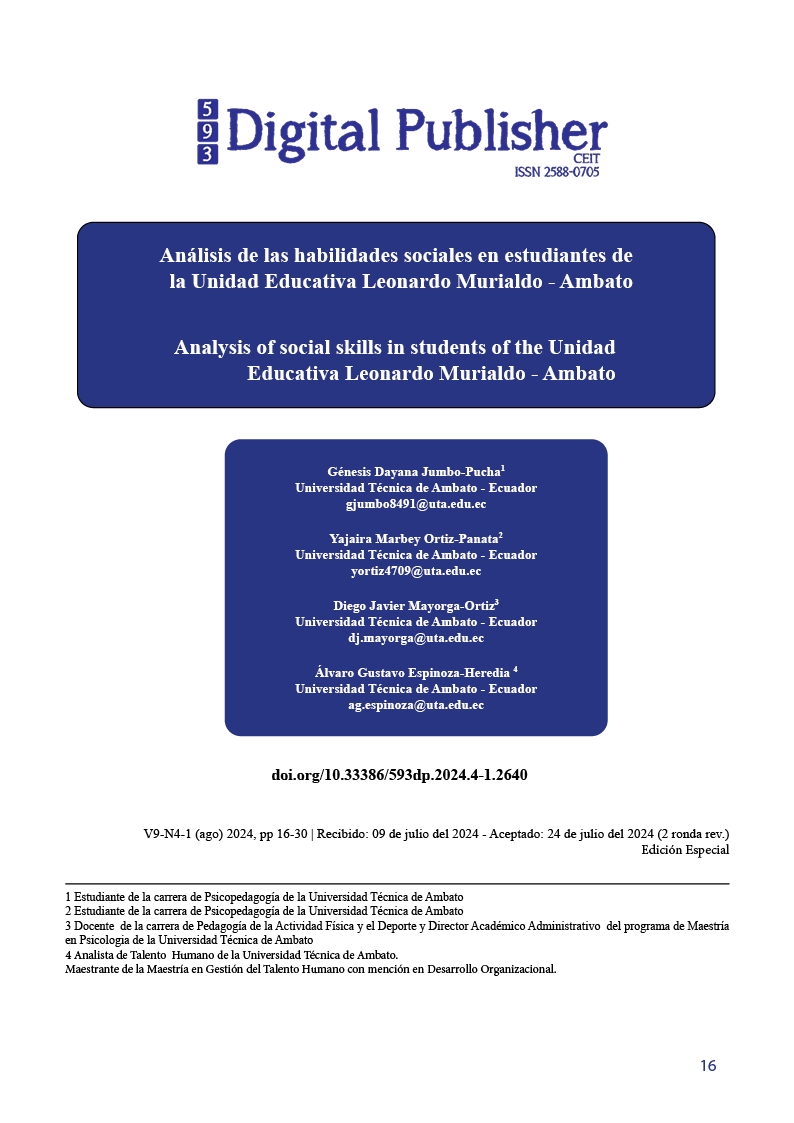Analysis of social skills in students of the Unidad Educativa Leonardo Murialdo - Ambato
Main Article Content
Abstract
Social skills are a set of behaviors that enable interaction and relationship with individuals who are part of the same environment, emphasizing the educational context, it is determined that social skills play a crucial role in the integral development of students, since they influence their academic performance and interpersonal adaptation within this environment, in addition, they stand out for allowing to express thoughts and feelings in an appropriate manner, strengthening effective communication and interpersonal relationships with others. The objective of this research is to analyze the set of behaviors and behaviors that encompass social skills and the level of these skills in the described population. The methodology used is non-experimental, cross-sectional, applied to a population of 30 students in the 8th year of EGB of the Leonardo Murialdo Educational Unit, by administering the Goldstein social skills scale. The results indicated that there are significant areas of improvement in four dimensions evaluated: advanced social skills, skills related to feelings, alternative skills to aggression and stress coping skills. The results emphasized the importance of implementing psycho-pedagogical strategies that promote the development of social skills, as well as the integral development of individuals, fostering a more enriching environment. In conclusion, the dimension of first social skills, together with planning skills, are the least affected dimensions, in contrast, the other 4 dimensions evaluated have high deficient levels.
Downloads
Article Details

This work is licensed under a Creative Commons Attribution-NonCommercial-ShareAlike 4.0 International License.
1. Derechos de autor
Las obras que se publican en 593 Digital Publisher CEIT están sujetas a los siguientes términos:
1.1. 593 Digital Publisher CEIT, conserva los derechos patrimoniales (copyright) de las obras publicadas, favorece y permite la reutilización de las mismas bajo la licencia Licencia Creative Commons 4.0 de Reconocimiento-NoComercial-CompartirIgual 4.0, por lo cual se pueden copiar, usar, difundir, transmitir y exponer públicamente, siempre que:
1.1.a. Se cite la autoría y fuente original de su publicación (revista, editorial, URL).
1.1.b. No se usen para fines comerciales u onerosos.
1.1.c. Se mencione la existencia y especificaciones de esta licencia de uso.
References
Acosta, D., Hernández, P., & Onofre, V. (2020). HABILIDADES SOCIALES Y SU IMPACTO EN LA EDUCACIÓN DEL INDIVIDUO. MAGAZINE DE LAS CIENCIAS REVISTA DE INVESTIGACIÓN E INNOVACIÓN Vol. 5, págs. 430-449.
Arzate, N., Moysén, A., Gurrola, G., & Zacarías, X. (2023). EVIDENCIAS PSICOMÉTRICAS PRELIMINARES DEL INSTRUMENTO DE HABILIDADES SOCIALES EN JÓVENES UNIVERSITARIOS DE MÉXICO. Revista Puerto Riqueña de Psicología, 34(1), 044 - 029. https://doi.org/https://doi.org/10.55611/reps.3401.04
Betina, A., & Contini, N. (2011). Las habilidades sociales en niños y adolescentes. Su importancia en la prevención de trastornos psicopatológicos. Fundamentos en Humanidades, XII(23), 159-182. https://doi.org/https://www.redalyc.org/pdf/184/18424417009.pdf
Biberos, G., Albújar, C., Becerra, E., & Fernández, F. (2023). Habilidades sociales en estudiantes de educación secundaria. Revista Conrado vol.19 no.94. http://scielo.sld.cu/scielo.php?script=sci_arttext&pid=S1990-86442023000500120
Carvajal, M. (25 de julio de 2022). Repositorio Latinoamericano. https://repositorioslatinoamericanos.uchile.cl/handle/2250/4822210?show=full
Demetriou, A., Golino, H., Spanoudis, G., Makris, N., & Greiff, S. (2021). The future of intelligence: The central meaning-making unit of intelligence in the mind, the brain, and artificial intelligence. Science Direct, 87. https://doi.org/10.1016/j.intell.2021.101562
Diego, G. (12 de junio de 2020). Scribd -Escala de Habilidades sociales . https://es.scribd.com/document/465327989/ESCALA-DE-HABILIDADES-SOCIALESARNOLD-GOLDSTEIN
Eagly, A. H., & Wood, W. (2023). The Nature-Nurture Debates: 25 Years of Challenges in Understanding the Psychology of Gender. Publmed, 8(3), 57-340. https://doi.org/10.1177/1745691613484767.
Esteves, A., Paredes, R., Calcina, C., & Yapuchura, C. (2020). Habilidades Sociales en adolescentes y Funcionalidad Familiar. Revista Comuni@cción. https://doi.org/http://dx.doi.org/10.33595/2226-1478.11.1.392
Goldstein, A. P., Sprafkin, R. P., Gershaw, J., & Klein, P. (1989). Habilidades sociales y autocontrol en la adolescencia. En R. P. Arnold P. Goldstein, Skillstreaming the Adolescent. Ediciones Martínez Roca, S. A.
González, A., & Molero, M. (2021). Las habilidades sociales y su relación con otras variables en la etapa de la adolescencia: una revisión sistemática. Revista Iberoamericana de Psicología, 113-123. https://doi.org/https://doi.org/10.33881/2027-1786.rip.15111
González, A., & Molero, M. D. (2021). Las habilidades sociales y su relación con otras variables en la etapa de la adolescencia: una revisión sistemática. Revista Iberoamericana de Psicología, 15(1), 113-123. https://doi.org/10.33881/2027-1786.rip.15111
Jaramillo, Honorato; Obregón, Norka; Reyes, Hugo. (23 de enero de 2021). Habilidades sociales y capacidad de manejo de conflictos interpersonales en docentes de un Instituto superior. Horizontes Revista de Investigación en Ciencias de la Educación, 5(19). https://doi.org/https://doi.org/10.33996/revistahorizontes.v5i19.241
Lara, A., Lara Napoleón, V. R., & Pullas, P. (2020). ORGANIZATION AND MANAGEMENT IN THE PREVENTION OF OCCUPATIO. Revista Científica de la Universidad de Cienfuegos, 1-8.
Maccoby, E. E. (1990). Gender and relationships. A developmental account. American Psychologist, 45(4), 513-520. https://doi.org/10.1037//0003-066x.45.4.513
Maelyn, J., Erick, O., & Miriam, V. (2024). Desarrollo de habilidades socioemocionales para gestionar contextos de crisis: Una experiencia con estudiantes universitarios. Esprint Investigación , 3(1), 39-47. https://doi.org/10.61347/ei.v3i1.64
Mateo, E., Bravo, J., Antezana, S., & León, J. (2022). Habilidades sociales en tiempos de pandemia COVID-19. Horizontes. Revista de Investigación en Ciencias de la Educación. https://doi.org/https://doi.org/10.33996/revistahorizontes.v6i25.427
Melodelgado, A., & Rodríguez, M. (2020). Habilidades sociales en niños y adolescentes. Una Revisión Teórica. Boletín Informativo CEI, 7(1), 69 –75. https://doi.org/https://revistas.umariana.edu.co/index.php/BoletinInformativoCEI/article/view/2200/2411
Méndez, J., Yncera, N., & Cabrera, I. (2022). Premisas y reflexiones teóricas para fundamentar un Programa de Entrenamiento en habilidades sociales en aolescentes. Dilemas contemporáneos Educación Política y Valores. https://doi.org/http://dx.doi.org/10.46377/dilemas.v9i3.3208
Mondragón, G., Moscol, J., & Uriarte, E. (Julio de 2023). Habilidades sociales en el contexto de la educación básica en Perú. Horizontes Revista de Investigación en Ciencias de la Educación. https://doi.org/https://doi.org/10.33996/revistahorizontes.v7i30.642
Moyolema, P., Freire, S., Mayorga, C., & Cosquillo, J. (Enero de 2024). Habilidades sociales como clave en el éxito académico. Digital Publisher CEIT. https://doi.org/doi.org/10.33386/593dp.2024.1-1.2268
Ramos, A., Josefina, M., & Villa, C. (2021). Habilidades sociales y la comunicación de los estudiantes. Journal of Business and entrepreneurial studies. https://doi.org/https://doi.org/10.37956/jbes.v4i2.84
Robinson, K. A., Perez, T., & Linnenbrink-Garciac, A. W. (2023). Gender Differences and Roles of Two Science Self-Efficacy Beliefs in Predicting Post-College Outcomes. National Center for Biotechnology Information, 90(2), 344–363. https://doi.org/10.1080/00220973.2020.1808944
Sacaca, L., & Pilco, R. (2022). Habilidades sociales en estudiantes de educación secundaria. Revista Estudios Psicológicos. https://doi.org/http://dx.doi.org/10.35622/j.rep.2022.04.009
Salavera, C., & Usán, L. y. (2021). Emotional intelligence and social skills on self-efficacy in Secondary Education students. Are there gender differences? Journal of Adolescence, 60(1), 39-46. https://doi.org/10.1016/j.adolescence.2017.07.009
Suhelim, G. F., & Araceli, H. C. (2023). Las habilidades sociales básicas en los niños de Preescolar: un proyecto de gestión de aprendizajes. Amauta, 21(42), 109-120. https://doi.org/10.15648/am.42.2023.3911
Tufiño, M., & Cayambe, J. (2023). Desarrollo de habilidades sociales para mejorar el rendimiento académico en los estudiantes de la unidad educativa 30 de abril. Ciencia Latina Revista Científica Multidisciplinar. https://doi.org/https://doi.org/10.37811/cl_rcm.v7i3.6310
Velastegui, R., Poler, R., & Díaz, M. (2023). APLICACIÓN DE ALGORITMOS DE APRENDIZAJE AUTOMÁTICO A SISTEMAS ROBÓTICOS MULTIAGENTE PARA LA PROGRAMACIÓN Y CONTROL DE OPERACIONES PRODUCTIVAS Y LOGÍSTICAS: UNA REVISIÓN DE LA LITERATURA RECIENTE. Dirección y Organización. Revista de Ingeniería y Organización.
Villacís, K., Mayorga, L., Mayorga, M., & Sánchez, K. (2023). Habilidades sociales y la educación virtual de estudiantes universitarios. ConcienciaDigital, 6(1.4), 862-879. https://doi.org/https://doi.org/10.33262/concienciadigital.v6i1.4.2037





